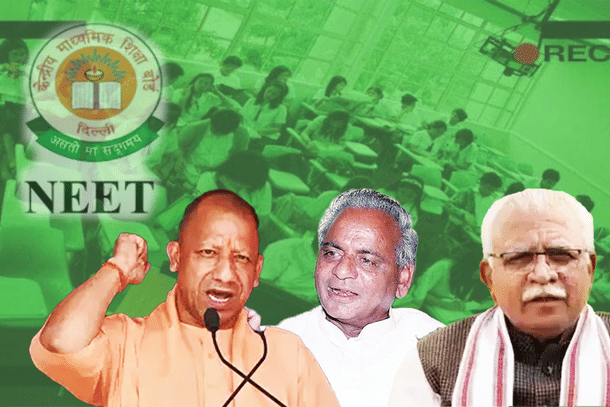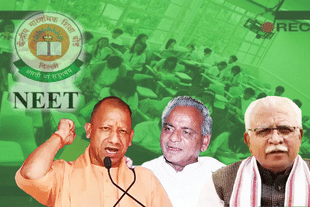Commentary
The BJP's Strange Relationship With Examinations
Abhishek Kumar
Jun 24, 2024, 05:10 PM | Updated Aug 05, 2024, 03:36 PM IST
Save & read from anywhere!
Bookmark stories for easy access on any device or the Swarajya app.


The Bharatiya Janata Party (BJP) is facing charges of laxity and mismanagement in the conduct of multiple examinations.
This is a paradoxical moment. Over the decades, the BJP has been associated with transparency and strictness, sometimes bordering on anti-democratic in its stance on examinations.
The party’s conflict with examination mafias first came to the fore in 1991 in Uttar Pradesh (UP). In the previous decade, the mafias had solidified their hold on the system; teachers, students, and government officials were hand-in-glove with them. If someone honest dared deny a monetary incentive in lieu of collaboration, gangsters would step in.
Watching it from the opposition benches, Kalyan Singh had become aware of the structural problem. Within months of becoming the state's chief minister, he introduced an anti-copying ordinance. He, along with Rajnath Singh, a physics lecturer-turned-education minister, pushed for it.
Because there was a provision for handcuffing of cheating students, it took time for the Singh duo to take their own cabinet on board. But the impact was apparent in the 1992 examination itself, as 17 per cent of school students left the examination midway. The pass percentages in the Class XII and X examinations were 14.70 per cent and 30.30 per cent respectively.
Newspaper stories featuring handcuffed students created a sensation and made the government unpopular. Mulayam Singh’s Samajwadi Party (SP) capitalised on the reactions to these photographs and withdrew the legislation after coming to power in 1993.
When Kalyan Singh came back to power in 1997, he reintroduced the anti-copying act with minor changes. However, with frequent changes in governments and the BJP being largely out of power for nearly two decades (after 1999), strictness had dissolved.
During these years, question paper leaks, cheating, and duplicate candidates were more of a norm than a deviation for UP students.
Things changed when Yogi Adityanath took charge as the state's chief minister in March 2017. He did not go all out on the legislative front; instead, he changed policy for the 2018 board examination.
The state government took steps such as the installation of CCTVs, a compulsory boundary wall around the school campus, and no student hostels or teacher residences inside the premises of schools that were chosen as examination centres.
Even the allotment process was made hybrid instead of manual; software would first approve schools fulfilling the criteria, and then a team of the district magistrate, the district education inspector, and other officers would visit the schools before the final approval.
Further, a special task force was created to help conduct free and fair examinations.
The number of examination centres came down from 11,415 to 8,549. As many as 1.25 lakh CCTVs guarded these centres. More than 10 lakh students dropped out of the examinations, 70 per cent of whom were students who had come to UP from other states, believing examinations in UP to be easy and corruptible.
The pass percentage for classes X and XII dropped to 75.16 and 72.43 per cent respectively, a steep decline from 81.2 and 82.6 per cent respectively, in the previous year.
The model was extended to other state-level competitive examinations with mixed success. The Adityanath administration formulated a zero-tolerance policy towards fraudulent examinations and candidates.
In response to these steps, the examination mafia upped their game. Multiple instances of paper leaks were reported from UP for years as a result.
While the governments of the past passed such news under the rug, the Adityanath government cancelled multiple examinations, including officer-level ones, on the slightest hint of a paper leak. It was a politically risky but policy-wise imminent step.
The Adityanath administration considers fraudulent examinations a national sin and calls the perpetrators the biggest enemies of society. Extending the Gangsters Act and the National Security Act (NSA) to the people behind fraudulent examination practices is on the government's agenda.
A new law is on the horizon with provisions like bulldozer action, jail sentences, and fines for those involved in violating the sanctity of examinations.
In the nearby state of Haryana, a similar problem troubled the Manohar Lal Khattar government during the first term and early part of the second term.
Allegations of paper leaks, even in examinations conducted by the Haryana Public Service Commission and the Haryana Staff Selection Commission, rocked the state government.
In 2021, they took the legislative route and passed the Haryana Public Examination (Prevention of Unfair Means) Bill, 2021. It mandated a jail term of up to seven years, a hefty fine, and the attachment of property.
The bill was able to curb the menace, though not fully, and was able to create a positive sentiment for the BJP among the youth of Haryana.
The Haryana law acted as a base for the Public Examinations (Prevention of Unfair Means) Bill 2024, passed by the Narendra Modi government in February 2024.
The law expanded the definitions under the Haryana bill and also broadened the scope of possible criminals under its ambit by giving special emphasis on organised crime.
Charged under central law, a person faces a possible jail term of 10 long years with a hefty fine of Rs 1 crore. The law has been notified and will be applicable to those found guilty in future cases.
It is tough to decode the BJP’s relationship with examinations. On one hand, it has taken a tough stance in states while in power, like UP, Haryana, Gujarat, Rajasthan and Bihar, as well as at the Centre, while on the other hand, red marks like paper leaks and even the Vyapam scam are under its sleeves.
Even the National Testing Agency, which was introduced to bring in transparency, is now a tainted name.
The incoherence indicates a rot in the system. At the top, there is a willingness for transparency, while those sitting lower down do not seem to care about it, probably because they gain from that attitude.
Abhishek is Staff Writer at Swarajya.





